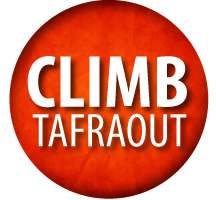Tafraout: Money
Many travellers to Morocco experience some difficulties with obtaining and using money, so the following notes will hopefully be of use to those visiting the area for the first time. The local currency is the Moroccan Dirham (DH or MAD), and in 2014 the exchange rate was approximately 13DH = £1, or 11DH = 1 Euro. The Dirham is a controlled currency, but can be obtained in the UK before your journey from bureaux de change beyond passport control. A much better exchange rate, however, will be available from the bank in Tafraout, so it’s only worth changing as much as you will need for the journey, or for your hire-car and petrol if it’s not pre-paid. Note that a maximum of 1000DH can be exported from the country, and officials in Marrakech airport have been seen searching wallets of passengers going through security.
Taking plenty of cash with you from the UK will prevent any time-consuming difficulties with ATMs and banks. Outside of the big cities it is safest to assume that you will require Dirhams to obtain petrol, food, and accommodation. A tank of petrol will cost between 300DH and 600DH (depending on where you get the fuel). In Tafraout there are three cash machines, and whilst they have proved more reliable than the one at Marrakech airport they have still been known to eat credit cards. If this happens, you can just go into the bank and retrieve your card from inside (as long as they’re open).
Most hotels will require payment in cash. This includes the Hotel Les Amandiers, who will accept cash-only payment in Dirhams, Euros, Sterling, or any combination thereof. There is no extra charge for this, and the exchange rate is generally perfectly acceptable. Many visitors have, therefore, found it convenient to take a reserve supply of Sterling in order to settle the hotel bill at the end of the trip. This allows you to efficiently use up all of your Dirhams before your flight home, without complicated calculations of how much cash to get.
Finally, it is worth noting that smaller shops and businesses will be unable to accept large notes (e.g. 200DH) for small transactions, as they generally don’t have enough change. Larger notes are always accepted in petrol stations or the supermarket, and residents of Les Amandiers can exchange them at the hotel reception.
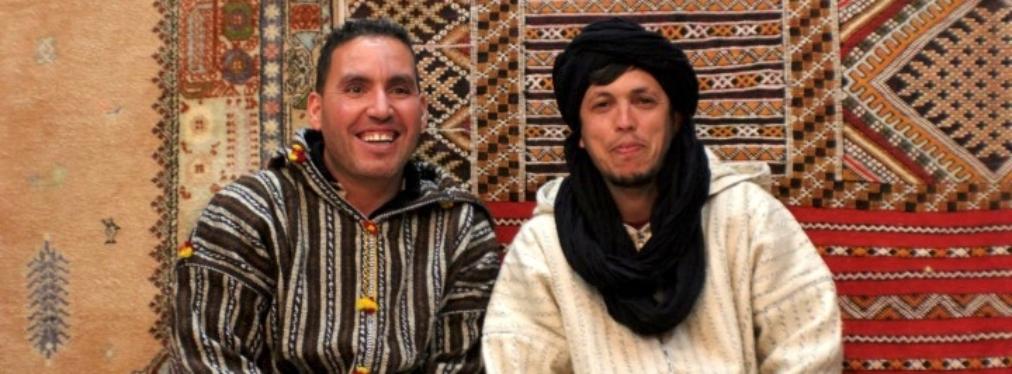
Tafraout: Culture
The Berber people of the Anti-Atlas follow many of the traditions of the Arabic World, and their hospitality is equally well renowned. The locals in and around Tafraoute are genuine and friendly people, who are usually pleased to host European travellers in their town. Having said that, their culture is very different to that of Western Europe, and tourists should ensure these differences are properly respected during their visits.
Religion
The Berber religion is Muslim, and whilst the people are not as devout as in some parts of the world they are still a relatively religious race ? a fact borne out by the frequent calls to prayer that echo around the remote valleys and across Tafraoute. The Muslim Berbers are forbidden to consume alcohol, and it is not generally available for purchase. Morocco does, however, produce its own beer and wine for sale to foreign tourists, and they do not take offence at Europeans drinking.
Standards for travellers
European travellers should remember that taking photographs can cause great offence to Muslims. As a general rule, always ask people before taking a photograph of them, and never attempt to take photos of women, or any government buildings.
All public displays of affection, including men and women holding hands should be avoided. In Arabic countries it is common to see men holding hands ? this is an accepted sign of friendship, but affection between the sexes is not expected in public.
Finally, travellers should adhere to accepted standards of dress ? remember that in the Berber culture people are simply not accustomed to many practices of Europeans, and inappropriate clothing can easily and innocently cause offence, particularly to the elderly. Knees should always be covered when out in public, so long trousers or long skirts should be worn rather than shorts. Likewise, shoulders should remain covered, so avoid wearing sleeveless T-shirts or strappy tops unless on high crags well away from shepherds, farmers, and villagers.
Language
The local language is Berber, but almost everyone understands Arabic. The better educated, including most waiters, mechanics, police, shopkeepers and so on will also have a basic understanding of French. Only very few people speak any English, apart from some hotel staff and the incredibly successful carpet-sellers. A few useful words in Arabic are Salamalaykum (Hello, or good day), Shokran (Thank you), and Marsalama (Goodbye).
Being a guest
It is not uncommon to be invited into someone?s house for tea, or to be offered food. Be aware that when offered tea, you will most likely be given food, and it is ungracious to refuse this. If offered food it is polite to refuse once, but then accept the offer when they persist! Once you have accepted food, remember the following:
- Eat with the right hand only, as the left is considered the dirty hand.
- Do not stop eating until other people do so, but keep nibbling slowly to show you are nearly full. If you do stop eating, the hosts will be obliged to stop as well.
Standard of living
Outside of town, in the small villages throughout Afantinzar and Samazar the impression of poverty is generally a false one. Many of the people are relatively wealthy, and having earned money in the cities have chosen a living in the countryside. Encouraging young children into begging is not to be recommended, so it?s best not to give in to kids pestering tourists for sweets.
The Berber people of the Anti-Atlas follow many of the traditions of the Arabic World, and their hospitality is equally well renowned. The locals in and around Tafraoute ar e genuine and friendly people, who are usually pleased to host European travellers in their town. Having said that, their culture is very different to that of Western Europe, and tourists should ensure these differences are properly respected during their visits.
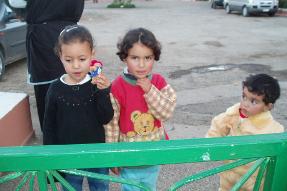
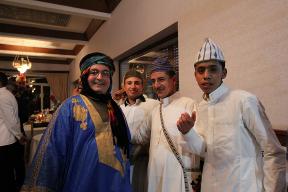
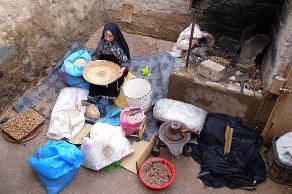

We've got a range of exclusive discounts on Tafraout hotels, including Les Amandiers, Les Amis, Hotel Argana, and the Auberge L'Escalade.
